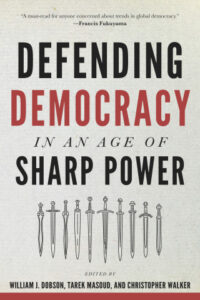 President Biden has made it his mission to wage what he momentously calls “the battle between democracy and autocracy.” But what to do when the ones he believes are undermining democracy are friends? The New York Times’s Peter Baker reports:
President Biden has made it his mission to wage what he momentously calls “the battle between democracy and autocracy.” But what to do when the ones he believes are undermining democracy are friends? The New York Times’s Peter Baker reports:
In the case of Israel, where Prime Minister Benjamin Netanyahu on Monday pushed through Parliament new curbs on an independent judiciary, Mr. Biden has chosen to speak out. The vote in Jerusalem, he declared, was “unfortunate,” the fourth time in a week he chastised Mr. Netanyahu for his drive to enhance his own power. But the president’s battle for democracy can be situational when it comes to America’s allies.
“Consistency is a challenge for most administrations when it comes to democracy and human rights concerns around the world, and this administration is no exception,” said David J. Kramer, who was assistant secretary of state for democracy, human rights and labor under President George W. Bush. “It’s easier to speak up when our enemies and competitors engage in authoritarian abuses,” he added. “It’s harder when it comes to friends and allies.”
Rather than viewing democracies as mere competitors, autocrats see them as an existential threat—whether by actions or example—to their grasp on power and their legitimacy at home and abroad, note analysts William J. Dobson and Tarek Masoud. Dictators are no longer content to shore up their own rule, they are now reaching across borders to prevent democracy where it does not yet exist, and to undermine it where it does.
 This new, muscular, outward-looking authoritarianism finds its most horrific expression in Vladimir Putin’s bloody invasion of Ukraine… or, quieter and more effectively, Xi Jinping’s hollowing out of the last vestiges of free speech and the rule of law in Hong Kong, they observe in Defending Democracy in an Age of Sharp Power, edited by Dobson, Masoud, and Christopher Walker. But it also finds less sanguinary—though no less dangerous—expression in the form of widespread propaganda that extols authoritarianism as somehow more able than democracy to cope with global challenges from climate change to economic underdevelopment to pandemics.
This new, muscular, outward-looking authoritarianism finds its most horrific expression in Vladimir Putin’s bloody invasion of Ukraine… or, quieter and more effectively, Xi Jinping’s hollowing out of the last vestiges of free speech and the rule of law in Hong Kong, they observe in Defending Democracy in an Age of Sharp Power, edited by Dobson, Masoud, and Christopher Walker. But it also finds less sanguinary—though no less dangerous—expression in the form of widespread propaganda that extols authoritarianism as somehow more able than democracy to cope with global challenges from climate change to economic underdevelopment to pandemics.
If authoritarianism’s challenges to democracy came only in the form of tanks and appealing stories, that would be threatening enough, but recent years have seen the world’s autocrats open an entirely new front in their war on liberal, representative government, they add. This new attack on democracy takes advantage of democracy’s very openness to weaken it from within. RTWT
Richard Fontaine, chief executive of Center for a New American Security, said America’s approach to promoting democracy abroad “has always been a model of inconsistency.” Mr. Biden is right that the world currently faces a contest of democracy versus autocracy and that the United States should stand up for the former, he said, but he must balance it against other objectives, The Times adds.
“The inconsistency and whataboutism are inevitable byproducts of a foreign policy that seeks changes in other countries’ domestic situations,” he said. “That’s not ground for abandoning the effort to support democracy abroad — just for understanding that it’s no easy task.”







